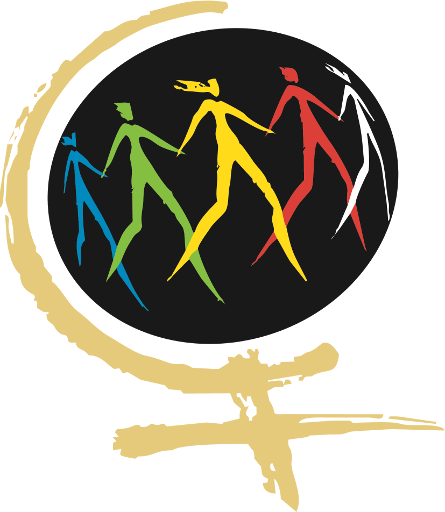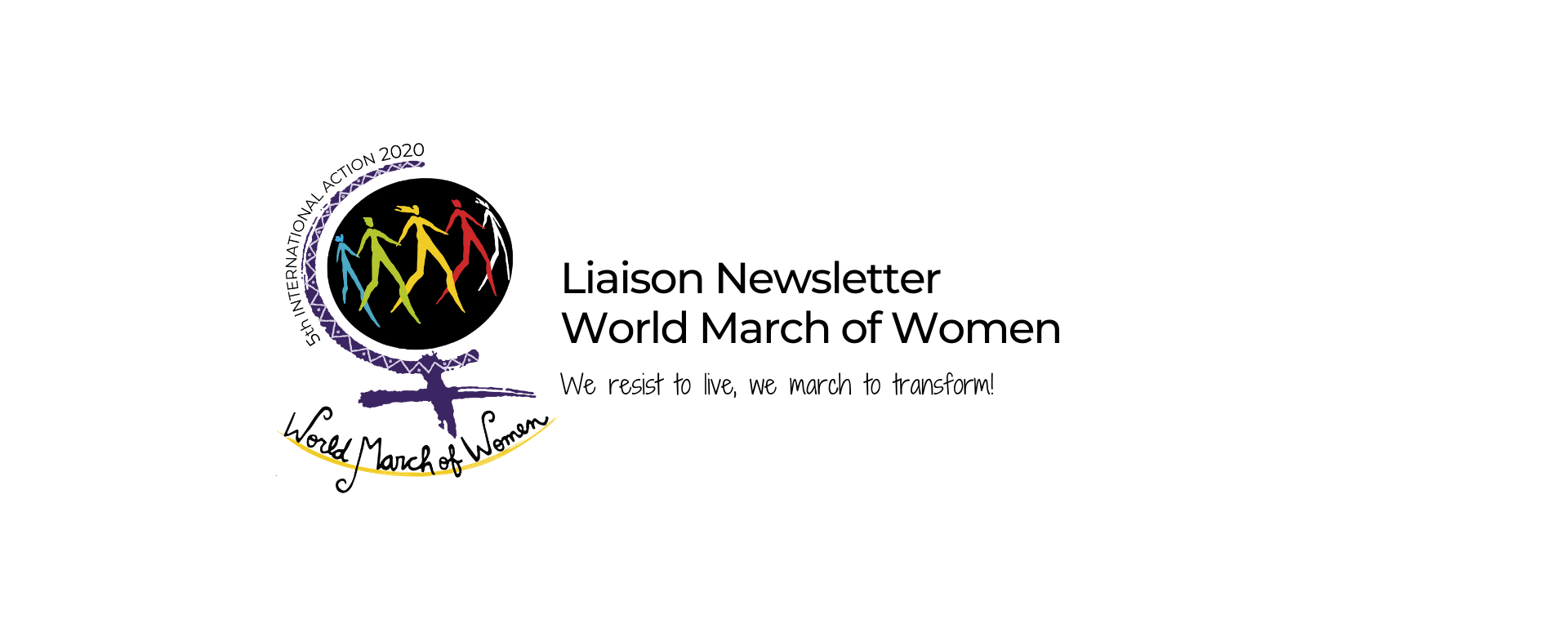
From October 12 to 17, the World March of Women closed its 5th International Action. With the slogan “We resist to live, we march to transform”, the Action marked the 20th anniversary of the WMW and organized the movements’ confrontations and feminist proposals, connecting local and global struggles.
On the 12th and 13th, there was a pilot of the Feminist School, which is being organized by the WMW and other partners, and will be inaugurated in March next year. “It is an opportunity to learn from everyone, to see our constructions based on our own experiences of struggles and defenses of our territories,” said Sandra Morán, from WMW Honduras. “The system of multiple oppressions affects us all but sometimes in different ways, being together in one space helps us to identify how it does and find ways to fight and build the global alternative”. More than 70 women from more than 27 countries around the world participated.
In addition, each day of the week was dedicated to a region of the world: Africa, Europe, Asia and the South Pacific, the Middle East and North Africa, the Americas.
The feminist struggle in the regions
On the 12th, women from nine countries in Francophone Africa released a short and powerful declaration in defense of life and territories, against capitalist plundering. “Our health and that of our region, our continent, and our planet, are interconnected: what affects one affects the other,” they say in the text.
On the 13th, the World March of Women of Europe published its regional document, synthesizing its confrontations with the crisis created by neoliberalism in the region and the growth of the extreme right.
The next day, of Asia and Oceania, women denounced the use of the pandemic as an excuse to open more doors to the power of multinational corporations and to debt. In Pakistan, women issued an open letter to the government, demanding the cancellation of the country’s debt to international financial institutions.
On the 15th, the WMW Middle East and North Africa held an online meeting to discuss the situation of women and land in the region. In the territories of Kurdistan, Lebanon, Morocco, Palestine and Tunisia, oppression against women and their peoples takes the form of apartheid and colonization, restriction of political rights and citizenship, forced displacement and urban real estate speculation as is the case in Lebanon after the explosion in Beirut. Women spoke of their resistance, their right to self-determination, their collective struggles.
On the 16th, the WMW in the Americas prepared the live debate “Our movement and the sustainability of life in the Americas”, which was attended by women from Quebec, the United States, Mexico, Guatemala, Cuba, Venezuela, Bolivia, Peru, Brazil, Chile and Argentina, with political speeches, music and poetry. The activity was translated into four languages: Spanish, English, French and Portuguese. The content of the Americas regional document is the result of a programmatic synthesis, built on a process of collective elaboration – there were three workshops during the months of July and August, which also resulted in the production of a series of three podcasts with talks by the women.
Feminist struggle and solidarity around the world
As in all previous Actions, the international closing was on October 17, the date marked in the calendar as International Day for the Fight against Poverty. On this day, we launched the declaration of the 5th International Action, in text and video, gathering the voices of women from all over the world. The video and the text can be seen in Spanish, English, French and Portuguese.
A closing live was attended by women from all regions, and was broadcasted in Spanish, French and Portuguese. The women spoke about the feminist resistance in their territories, marked by the confrontation with the capital and the struggle in defense of life. “The women of the region maintain the struggle for a better tomorrow, where the people can live without tyranny, with equality and self-determination,” said Ruba Odeh of Palestine. According to Nalu Faria, from Brazil, throughout this International Action “we have connected our 20 years to the history of women who fight, who have been marching for a long time, participating in all the struggles for liberation”.
Graça Samo, of the MMM International Secretariat, recovered the history of the movements’ construction. “The strength of our movement is a starting point for alternatives to sustain life in our communities. Together, as a movement, we are more able to resist all forms of oppression,” she said.
During the live, the video that gathers the messages of the WMW’s allied organizations in Spanish, English and French was released. Self-organization and the building of strategic alliances are political stakes that have accompanied the World March of Women since the beginning. These are talks by international organizations such as Vía Campesina and Friends of the Earth International, as well as regional organizations such as the MST, the Trade Union Confederation of Workers of the Americas (CSA-TUCA), the Coalition against Trafficking in Women, the pan-african ecofeminist alliance WoMin and several others.
In addition, on the 17th we participated in the 24h Feminist Solidarity. From 12 noon to 1pm, around the globe, the women made symbolic actions in the streets and in the networks.
In Suiza, it was launched in the book Behind the Walls, about the daily life of migrant women during the Covid-19 crisis. In the Basque Country, WMW organized a symbolic action denouncing borders, migration policies and transnational corporations. In Portugal, women produced a manifesto and a video on the importance of feminism. In the Autonomous Region of the Azores, they made a stick of resistance, and those from the city of Coimbra also gathered for a symbolic action. In Galicia, the activities were on the 16th and 18th: an intervention in the square and a public lecture on the feminization of poverty.
In France, videos have been made on the following themes: ecofeminism; gender-based violence in the domestic sphere; women, migration, territories; prostitution system and GPA: the commodification of women’s bodies. In September, a “Feminist Forum for Thinking Tomorrow” brought together more than 200 women from different regions of France. For the closing process of the Action, in addition to a workshop on Digitalization and Women, on the 3rd and 4th, the WMW in Turkey held on the 17th a seminar on food sovereignty and feminist agroecology. Both activities put the importance of women’s and peoples’ resistance to the appropriation of our common goods by transnational corporations.
In Mexico and Guatemala, virtual debate activities took place. In Honduras, WMW gathered for a round table discussion. In Quebec, the March launched a campaign with demands in the fight against poverty, violence against women and all forms of racism and colonialism and for climate justice.
In Venezuela, the WMW held the “II Colloquium: Challenges of Feminisms in a New Reality” in two days and the forum “Putting Life Sustainability at the Center: Experiences and Economic Alternatives in Venezuela”. They also made a network intervention with images of a street activity in an urban agricultural space. In Brazil, women organized flyers and solidarity actions, with distribution of masks, food and hygiene products. In Peru, the women produced images with extracts from the international declaration and in the Macronorte region, they released videos on feminist and solidarity economy and on violence and militarization in the pandemic.
In several provinces of Mozambique and Kenya, women gathered for collective activities celebrating the closure.In Ivory Coast, they recorded a video against discrimination and in defense of the land. In the Philippines, the WMW held an online event on “Women’s power against exploitation, capitalism and authoritarianism”, putting forward a statement in defense of women’s lives in the face of authoritarianism. The WMW demonstrated in Morocco, Tunisia, Kurdistan and Palestine in solidarity and struggle.
All these activities combined have thus positioned solidarity as a feminist principle and as a practice of struggle, which links resistance to transformation. The 5th International Action closes, but the feminist struggle continues, strong and permanent: resisting to live, marching to transform!

